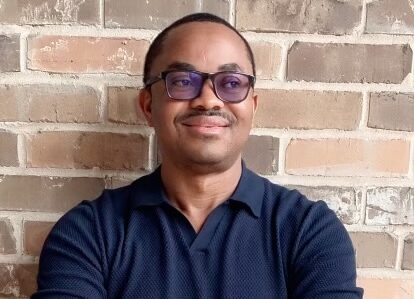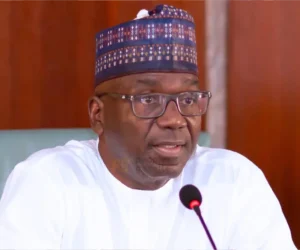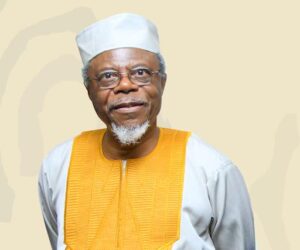
…when the chronicle of this struggle is finally written, history will not remember those who paralysed their own people in the name of resistance. It will remember the man who dared to confront power on its own sacred ground; the one who carried the fight from the dusty streets of despair to the fortified gates of tyranny, and made the mighty flinch, if only for a fleeting moment. For that audacity alone, Omoyele Sowore has earned not scorn, but our enduring respect.
At the crack of dawn on Monday, 20 October, the usually bustling arteries of Abuja were transformed into a fortress. By 6:00 a.m., combined contingents of soldiers, police officers, and operatives of the State Security Services (SSS) had fanned out across the city centre, sealing off access to the Three Arms Zone, the sanctum of Nigeria’s political power housing the Presidential Villa, the National Assembly, and the Supreme Court.
Armoured vehicles squatted menacingly at key intersections: Toyota Hilux trucks formed barricades across Yakubu Gowon Crescent in Asokoro, while grim-faced men in uniform stood guard, their presence the foreboding symbol of a government on the edge.
The tension was not misplaced. For the first time in the long and tortuous struggle to free Nnamdi Kanu, leader of the Indigenous People of Biafra (IPOB), the Nigerian government was being made to feel a modicum of the pressure it had so callously imposed on others. At the heart of this new wave of agitation stood one man: Omoyele Sowore.
You may scoff at him from the safety of your comfort zone, dismiss him as a rabble-rouser, or mock the image of him ducking live bullets. You may question his motives or ridicule his defiance. But what you cannot deny is that Sowore, through sheer audacity and persistence, has managed, in just two weeks, to shake the complacency of a government long accustomed to governing without consequence. He has succeeded where bishops, monarchs, politicians, and countless civil society actors couldn’t: he forced Aso Rock to take notice.
For the first time in years, the agitation for Kanu’s release dominated national headlines and compelled both President Tinubu’s administration and the ruling All Progressives Congress to respond publicly. In the stagnant pool of Nigeria’s political inertia, that alone is a tremor worth celebrating.
Before now, many of us had challenged the wisdom of the Monday “sit-at-home” orders that have become the South-East’s recurring nightmare. We argued, rightly, that you cannot profess to fight for a people’s freedom while simultaneously strangling their livelihoods. The artisans, petty traders, transporters, and subsistence farmers who live from hand-to-mouth have borne the heaviest burden of this misbegotten strategy. Each Monday of paralysis is another wound in a region already bleeding from decades of neglect and over-militarisation.
What kind of liberation movement punishes its own? Instead of taking the fight to Abuja, the true theatre of power, many have chosen to terrorise their kin, creating a siege mentality in their own homeland. The cruel irony is that the victims of the lockdowns are not government bureaucrats or politicians, but ordinary men and women already crushed by the weight of survival under a state that treats them as suspects.
Let us be clear: the call for Nnamdi Kanu’s release is no longer merely about one man. It is not an endorsement of IPOB’s excesses, which have rightly drawn criticism. It is about what his continued incarceration represents – the institutionalisation of double standards, the perception that the South-East is governed by a harsher, more punitive logic than any other region.
That is why Sowore’s intervention marks a turning point. He has redirected the struggle to its rightful arena; the seat of power where the architects of injustice reside and from where decisions of consequence emanate. His protest was not a regional tantrum but a national moral statement.
Of course, there are whispers that some Igbos have worked against Kanu’s release. That may hold some truth, but it is disingenuous to ignore the relentless efforts of countless Igbo groups and indeed non-Igbo allies who have repeatedly journeyed to Abuja to plead for his freedom. From the Buhari years to the Tinubu administration, delegations of traditional rulers, clergy, and statesmen have made overtures to the powers that be, all in vain.
What Sowore has done is to reframe the issue, stripping it of its ethnic garb and presenting it for what it is: a question of justice and equality before the law. His defiance is not for the Igbo cause alone but for the soul of a nation that has made selective justice its moral compass.
Sowore is cut from the same cloth as Gani Fawehinmi, Fela Anikulapo-Kuti, and the uncompromising lineage of Nigerian dissent. His is the voice that refuses to be tamed, the conscience that cannot be bought. I have long admired his courage, even if at times his tactlessness undermines his message. You cannot berate Peter Obi one day and expect his cooperation the next day; politics, after all, is as much about persuasion, as it is conviction. But flaws notwithstanding, Sowore’s relentless crusade against tyranny remains one of the few bright flames in the darkening Nigerian firmament.
Some sneer that it took a Yoruba man to champion an Igbo struggle. That argument is as hollow as it is toxic. Sowore has never filtered justice through the lens of ethnicity. He understands, as every enlightened mind must, that injustice is an equal-opportunity destroyer. The moral obligation to resist oppression transcends geography and tribe. After all, many Igbos, the likes of Chuma Ubani, Arthur Nwankwo, and others, risked imprisonment and death during the June 12 struggle for Moshood Abiola’s mandate. They did not fight for a Yoruba cause; they fought for a Nigerian ideal.
Let us be clear: the call for Nnamdi Kanu’s release is no longer merely about one man. It is not an endorsement of IPOB’s excesses, which have rightly drawn criticism. It is about what his continued incarceration represents – the institutionalisation of double standards, the perception that the South-East is governed by a harsher, more punitive logic than any other region.
His imprisonment has become the pretext for criminal opportunists to impose ruinous “sit-at-home” orders that have gutted the South-East’s economy and psyche. His release would likely undercut this pretence, robbing these marauders of their excuse for terror. Yet, the government’s obstinate refusal to act sustains a growing sense of alienation and fuels the dangerous conviction that the Nigerian State has no empathy for the Igbo plight.
In an age in which silence has become a survival strategy, Sowore’s voice, unrefined sometimes but fearless, echoes as a challenge to the rest of us. He reminds us that moral authority is earned not through rhetoric but through risk. His methods may offend sensibilities, his tone may be abrasive, but his purpose is unambiguous: to force power to reckon with its hypocrisy.
The larger issue, however, transcends Kanu himself. It speaks to the perception, borne of history and confirmed by policy, that Nigeria operates two systems of justice: one lenient and conciliatory for some, the other harsh and vindictive for others. The same government that courted Niger Delta militants with cash and contracts has refused dialogue with Igbo agitators. The same State that quietly dropped charges against Sunday Igboho and rehabilitated thousands of “repentant” Boko Haram fighters, sees no reason to temper justice with mercy for Nnamdi Kanu.
When President Tinubu recently granted clemency to 175 convicts, among them kidnappers, drug traffickers, and fraudsters, the omission of Kanu’s name was neither an accident nor an oversight. It was a deliberate act; a message encoded in silence.
Sowore’s march on Abuja is, therefore, not just a protest; it is a confrontation with the Nigerian conscience. It is a reminder that true courage lies not in online activism or regional bravado but in standing, physically and morally, in the line of fire. While others retreat behind hashtags, he has chosen to occupy the very space that power guards most jealously.
His action should provoke reflection among those who claim to fight for justice yet choose tactics that harm their own. Real activism does not thrive on fear; it dismantles it. It does not terrorise the weak; it confronts the mighty.
In an age in which silence has become a survival strategy, Sowore’s voice, unrefined sometimes but fearless, echoes as a challenge to the rest of us. He reminds us that moral authority is earned not through rhetoric but through risk. His methods may offend sensibilities, his tone may be abrasive, but his purpose is unambiguous: to force power to reckon with its hypocrisy.
And so, when the chronicle of this struggle is finally written, history will not remember those who paralysed their own people in the name of resistance. It will remember the man who dared to confront power on its own sacred ground; the one who carried the fight from the dusty streets of despair to the fortified gates of tyranny, and made the mighty flinch, if only for a fleeting moment. For that audacity alone, Omoyele Sowore has earned not scorn, but our enduring respect.
Osmund Agbo is a medical doctor and author. His works include Black Grit, White Knuckles: The Philosophy of Black Renaissance and a fiction work titled The Velvet Court: Courtesan Chronicles. His latest works, Pray, Let the Shaman Die and Ma’am, I Do Not Come to You for Love, have just been released. He can be reached@ [email protected]








